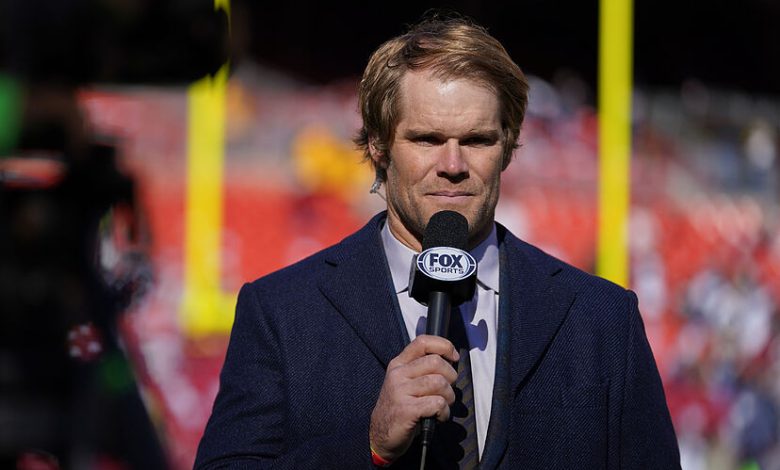Greg Olsen, a former tight end for the Miami Hurricanes, complains about being demoted at Fox Sports during Super Bowl LIX.

Greg Olsen, a former tight end for the Miami Hurricanes and a key figure in the NFL, has long been a respected name in football. After retiring from a stellar playing career, including a significant stretch with the Carolina Panthers, Olsen transitioned into broadcasting, joining Fox Sports as a commentator and analyst. His charismatic and insightful approach to the game quickly made him a fan favorite, and many viewed him as one of the rising stars of NFL commentary.
However, Olsen’s recent complaints about being demoted at Fox Sports during Super Bowl LIX have created a stir in the sports media world. Known for his outspoken nature and deep love for the game, Olsen’s frustrations have sparked discussions about the challenges of the broadcasting world, the dynamics of network sports commentary, and the expectations placed on former athletes when they transition to a new career path.
This piece will examine Greg Olsen’s demotion at Fox Sports, explore the reasons behind his complaints, and delve into the broader context of the broadcasting landscape and what it means for retired athletes trying to make their mark as commentators.
The Rise of Greg Olsen as a Broadcaster
After retiring from the NFL in 2020, Greg Olsen wasted no time in making the leap into sports broadcasting. His transition was not without challenges—many former athletes struggle to find their place in the broadcast booth, particularly when it comes to building an authentic and engaging connection with audiences. However, Olsen’s natural charisma and ability to break down the game in an insightful yet approachable way set him apart. His deep knowledge of football, particularly his experience as a tight end, helped him establish credibility in a field where authenticity is key.
Olsen quickly earned the role of a game analyst for Fox Sports, calling regular-season NFL games alongside play-by-play announcer Kevin Burkhardt. His clear, engaging style, coupled with a deep understanding of the intricacies of football, made him a natural fit for the job. Fans and analysts alike praised his commentary, noting that he brought a fresh perspective to the booth. His blend of personality and analysis helped elevate Fox Sports’ NFL coverage, making him one of the most sought-after broadcasters in the game.
Olsen’s career trajectory was set to continue on an upward path. Many believed he was poised to become one of the top voices in NFL broadcasting. However, just a few years into his post-retirement broadcasting career, Olsen’s fortunes took an unexpected turn with a demotion that shook both his personal confidence and the perception of his standing within Fox Sports.
The Demotion at Fox Sports During Super Bowl LIX
In the lead-up to Super Bowl LIX, Olsen found himself being demoted from his expected role as a lead analyst for the game. Instead of being positioned as the main color commentator alongside Burkhardt, Olsen was relegated to a secondary role, with former NFL coach and analyst, Tom Brady, replacing him as the head analyst for the Super Bowl broadcast.
The decision to demote Olsen came as a surprise to many, considering his strong performance in previous seasons and his growing popularity among viewers. His demotion sparked immediate backlash from fans and sports media personalities who felt that Olsen was unfairly sidelined in favor of the more high-profile Brady, a living legend of the game. The move raised a variety of questions regarding network decision-making, the balance of power in sports broadcasting, and the nature of the broadcasting industry’s reliance on star power.
Olsen, known for his candid personality, did not shy away from expressing his dissatisfaction with the decision. Reports surfaced that Olsen felt blindsided and frustrated by the move, particularly since he had been heavily involved in the lead-up to the Super Bowl and had prepared thoroughly for the role of calling the biggest game of the season. In interviews, Olsen voiced his displeasure with the network’s handling of the situation, hinting that the decision was made due to corporate interests rather than merit-based reasoning.
While Fox Sports did not officially comment on the specific reasons behind the demotion, many speculated that it was a business decision to elevate Brady, a high-profile name with significant star power, to the primary role for the Super Bowl broadcast. As one of the most decorated players in NFL history, Brady’s presence at the microphone brought added attention to Fox Sports’ Super Bowl coverage, a crucial broadcast for the network.
The Broader Context of the Demotion: Star Power vs. Merit
At the heart of Olsen’s complaints is the broader issue of star power versus merit in the sports broadcasting world. The entertainment industry, particularly in sports media, has increasingly become a platform where marquee names and celebrities are often prioritized for their marketability, rather than their broadcasting acumen or experience.
Olsen, with his extensive knowledge of the game and proven ability as an analyst, found himself overshadowed by Tom Brady’s status as a transcendent NFL figure. While Brady’s potential as a broadcaster is still largely untested, his name recognition alone made him a more marketable asset for Fox Sports. In the world of sports broadcasting, the line between a skilled commentator and a celebrity personality can sometimes blur, and Olsen’s demotion underscored the tension between these two elements.
The decision to bring in Brady as the lead analyst for the Super Bowl also highlighted the growing trend of networks prioritizing star power in an era where ratings and viewer engagement drive business decisions. In many ways, Brady’s status as one of the greatest football players of all time made him an attractive addition to Fox Sports, despite his lack of experience in broadcasting. This phenomenon is not unique to Fox Sports; it is a trend that has been observed across many networks, with former athletes—particularly those who are widely recognized—being given significant platforms in the media, even if their on-air talents have not been fully tested.
For Olsen, this development was a bitter pill to swallow. Despite his success as a broadcaster, he was ultimately sidelined in favor of a name whose star power transcends his broadcasting skills. This not only stung personally for Olsen but also spoke to the larger issue of how networks approach talent selection in sports commentary.
The Personal Impact on Greg Olsen
Olsen’s complaints about the demotion reveal more than just a professional disappointment; they highlight the emotional and personal impact of being overlooked despite his accomplishments. For Olsen, the move represented a setback in his fledgling broadcasting career, a position that he had worked hard to attain after his football career. Many of his supporters believed that he had earned his place as a top analyst, and the demotion felt like a slap in the face to those who had been cheering for his success.
In interviews following the demotion, Olsen expressed frustration with how he had been treated by Fox Sports, stating that he had put in the work, built relationships with his colleagues, and prepared meticulously for his role. He spoke candidly about the disappointment he felt, not just as a professional but as someone who had invested so much of his time and energy into making a successful transition into the broadcasting world. For Olsen, the demotion wasn’t just a professional challenge; it was a deeply personal blow.
His comments reflected the emotional toll that comes with the high-stakes nature of sports broadcasting. Like many former athletes transitioning to media roles, Olsen had placed a significant part of his identity in his new career. To have that career abruptly altered, especially on the biggest stage in sports, felt like a major setback.
The Business of Sports Broadcasting: Networks and Branding
At the heart of Olsen’s demotion was the business side of sports broadcasting. Networks like Fox Sports, ESPN, and NBC are constantly seeking ways to maximize viewership and engagement, and one of the most direct ways to do this is by capitalizing on star power. Tom Brady, with his seven Super Bowl rings and global recognition, is a media sensation in his own right. By placing him at the forefront of their Super Bowl coverage, Fox Sports was playing the game of building their brand by associating it with one of the most famous athletes of all time.
For Fox Sports, this was a strategic business decision. Networks understand that the Super Bowl is not just another game; it is a spectacle that draws millions of viewers, and the choice of commentators can significantly influence the broadcast’s success. In this case, the decision to bring in Brady was about more than just his potential as a commentator—it was about aligning the network with an iconic brand that would resonate with viewers.
In this business context, Greg Olsen’s complaints become understandable. While Olsen is an excellent analyst in his own right, his status as a former player simply did not carry the same weight as Brady’s, even though he had proven his worth in the broadcast booth. The decision to demote Olsen was a reflection of the commercial realities of sports media, where networks often prioritize big names over expertise.









